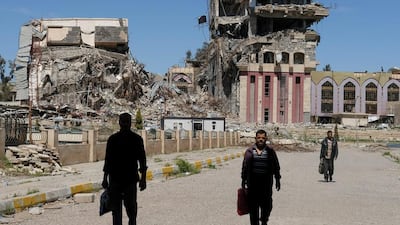Beneath an image of a quill, ink-pot and scroll of parchment on the cover of a grammar textbook is a sinister picture of fighters manning sub-machine guns on desert front lines. Another shows a stack of books, above which stands a masked fighter brandishing a rocket-propelled grenade and holding up the one-finger salute that ISIL co-opted as one of their emblems.
Independent, intellectual thought had no place under ISIL rule in Mosul. "This was the [ISIL] education system," Arabic language teacher Nabir, 36, told The National in newly-liberated east Mosul, flicking through a textbook, its pages dotted with miniature Kalashnikov logos. "IS destroyed all our textbooks and printed their own."
Nabir points out highlighted quotations from prominent Islamic scholars relating to jihad, and another that encourages young men to fight with ISIL in Fallujah and undertake suicide-bombing operations.
“I had to teach everything in this book, even though the purpose of it was pure brainwashing and encouraging young people into the same thinking as ISIL,” he says, shaking his head.
He explains that, after ISIL completely changed Mosul’s education system in 2015, teachers – most of whom disagreed with the new curriculum – stopped turning up for work but were soon hunted down in their homes. Anyone who refused to return to their teaching position was thrown into jail.
Although teachers were forced to continue working in Mosul’s schools and colleges, students were not obliged to attend classes and Nabir says he generally faced rows of empty desks.
“From the time ISIL changed the education system, installing their own curriculum and printing their own textbooks, 90 per cent of people stopped letting their children attend school because they were being taught to fight, to kill and to become monsters, so only ISIL’s own children turned up,” he says. “There used to be between 30 and 50 people in a class but, under ISIL, I only had four or five students per class.” Student Abdulrahman, 19, recalls that his secondary school, which formerly had 700 pupils, dropped to as few as 30 after ISIL introduced its curriculum in September 2015. “Nobody wanted to study their rubbish so we all stayed at home but, with no school, TV or internet – which ISIL banned – the boredom was unbearable,” he says. “And now, after liberation, I’m back in the 11th grade, studying the same stuff as I studied in 2014.”
The few civilian children who did still attend Mosul schools stopped going after ISIL demanded fees. With most salaries unpaid for two years, few families had any income and were scraping by on savings, so they could ill-afford the charges anyway.
“It was ridiculous. Kids had to pay to go to school while we were forced to teach for free,” Nabir says. “Of course I kept my sons at home and taught them everything I could but most Mosul children have been without any education at all for more than two years.”
Maintaining Mosul’s education sector was part of a veneer of normality which ISIL attempted to preserve in Iraq’s second-biggest city, glossing over an increasingly brutal rule where corporal and capital punishments were routinely meted out in public.
The medical sector was deemed one of the most vital to preserve and so pharmacy and medical students were forced to continue class attendance despite their curriculum being altered.
“They supplemented our studies with books about their religion and instruction on what we should believe and how we should behave,” says Nora, 22. “Actually, many pharmacy students converted and joined ISIL. Some of them were from very good, well-educated and wealthy families but their parents couldn’t control their children.”
Staff in Mosul University’s medical department were also forced, on pain of death, to stay in their posts. “After ISIL came, we stopped going to work but they forced us to return by threatening to hang anyone who didn’t go, especially medical staff and lecturers,” says university professor Nazir, 62. “All the medical staff were afraid, so we went back to work.”
He explains that, when Iraqi forces launched the Mosul offensive in October, ISIL ramped up the pressure. Even as bombs and mortars fell across east Mosul – ordnance which left the city’s university in ruins – medical staff were summoned to work.
“They tried to make us treat injured ISIL fighters but I refused, telling them I was only a teacher, not a practitioner,” Nazir says. “For three years we survived like this under ISIL.”
Walking through the burnt-out remains of his home in west Mosul, which ISIL commandeered to use as a makeshift field hospital and then set ablaze before fleeing, he says: “This destruction is nothing really, compared to what we experienced under IS. We survived at least, and we say thank God for our lives.”
Tom Westcott is a freelance journalist based in the Middle East and North Africa.

